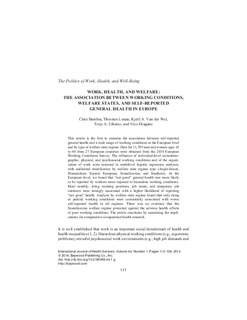Work, Health, and Welfare: The Association between Working Conditions, Welfare States, and Self-Reported General Health in Europe
Journal article, Peer reviewed
Permanent lenke
http://hdl.handle.net/11250/2386692Utgivelsesdato
2014Metadata
Vis full innførselSamlinger
Sammendrag
This article is the first to examine the association between self-reported
general health and a wide range of working conditions at the European level
and by type of welfare state regime. Data for 21,705 men and women ages 16
to 60 from 27 European countries were obtained from the 2010 European
Working Conditions Survey. The influence of individual-level sociodemographic,
physical, and psychosocial working conditions and of the organization
of work were assessed in multilevel logistic regression analyses,
with additional stratification by welfare state regime type (Anglo-Saxon,
Bismarckian, Eastern European, Scandinavian, and Southern). At the
European level, we found that “not good” general health was more likely
to be reported by workers more exposed to hazardous working conditions.
Most notably, tiring working positions, job strain, and temporary job
contracts were strongly associated with a higher likelihood of reporting
“not good” health. Analysis by welfare state regime found that only tiring
or painful working conditions were consistently associated with worse
self-reported health in all regimes. There was no evidence that the
Scandinavian welfare regime protected against the adverse health effects
of poor working conditions. The article concludes by examining the implications
for comparative occupational health research.
